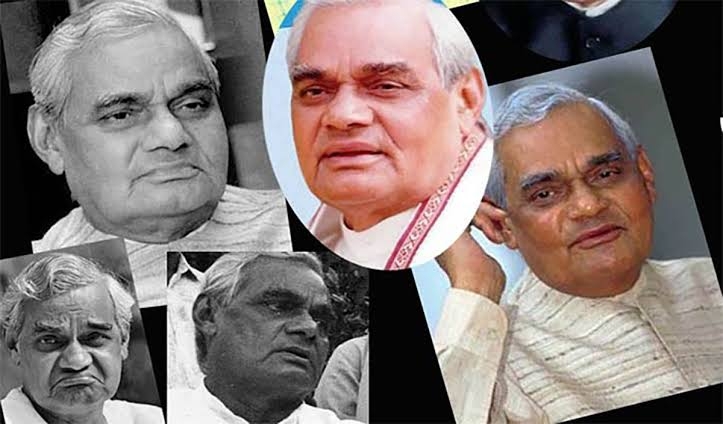Atal Bihari Vajpayee: A Statesman Beyond Compare
Beyond politics, Vajpayee was a celebrated poet whose words resonated deeply. His works, like Meri Ekyaavan Kavitayen, reflected themes of love, patriotism, and humanity. His eloquent parliamentary speeches showcased his wit, wisdom, and ability to connect with people across ideologies.

Building Modern India with Vision
Atal Bihari Vajpayee served as the Prime Minister of India from 1998 to 2004. As the first non-Congress leader to complete a full term, he redefined Indian politics. He guided the Bharatiya Janata Party (BJP) to national prominence and focused on development and economic progress.
One of his boldest moves was conducting the Pokhran-II nuclear tests in 1998. Despite global criticism and sanctions, he showcased India’s strength and sovereignty. This decision established India as a nuclear power and elevated its global standing.
Driving Infrastructure and Economic Growth
Vajpayee initiated transformative projects to improve India’s infrastructure. The Golden Quadrilateral Project, which connected the country’s major metros through world-class highways, stands as a testament to his vision. This project boosted trade, reduced travel times, and improved connectivity.
He also revolutionized the telecom sector with the New Telecom Policy of 1999. By privatizing the sector, he made mobile phones affordable and accessible to the masses. These reforms fueled India’s digital revolution and empowered millions.
Strengthening Foreign Relations
Vajpayee approached foreign policy with a balance of strength and diplomacy. He initiated the Lahore Bus Service in 1999 to foster better relations with Pakistan. Despite setbacks like the Kargil War, he maintained India’s dignity and ensured peace remained a priority.
He also strengthened India’s relations with the United States, laying the groundwork for the India-US Civil Nuclear Agreement. His leadership ensured India’s interests were always at the forefront in global affairs.
Touching Lives Through Poetry
Beyond politics, Vajpayee was a celebrated poet whose words resonated deeply. His works, like Meri Ekyaavan Kavitayen, reflected themes of love, patriotism, and humanity. His eloquent parliamentary speeches showcased his wit, wisdom, and ability to connect with people across ideologies.
Leading with Compassion
Vajpayee’s policies focused on improving lives across India. The Pradhan Mantri Gram Sadak Yojana brought better road connectivity to rural areas, boosting livelihoods and opportunities. He also launched the Sarva Shiksha Abhiyan, which aimed at universalizing elementary education for children.
He believed in democracy and inclusivity, often building consensus even with opponents. This ability to unite different voices made him a widely respected leader across the political spectrum.
Honoring His Legacy
India awarded Vajpayee the Bharat Ratna, the nation’s highest civilian honor, in 2015. The government also declared his birthday, December 25, as Good Governance Day, celebrating his unwavering commitment to transparency and accountability.
Inspiring Generations
Atal Bihari Vajpayee’s life epitomized optimism and resilience. He transformed challenges into opportunities and worked tirelessly for a stronger India. His leadership, marked by compassion and foresight, continues to guide the nation.
On his birth anniversary, let us celebrate Vajpayee’s legacy and strive to uphold the values he cherished—democracy, inclusivity, and patriotism. His contributions remind us that leadership is not about power but about serving with integrity and humility.


